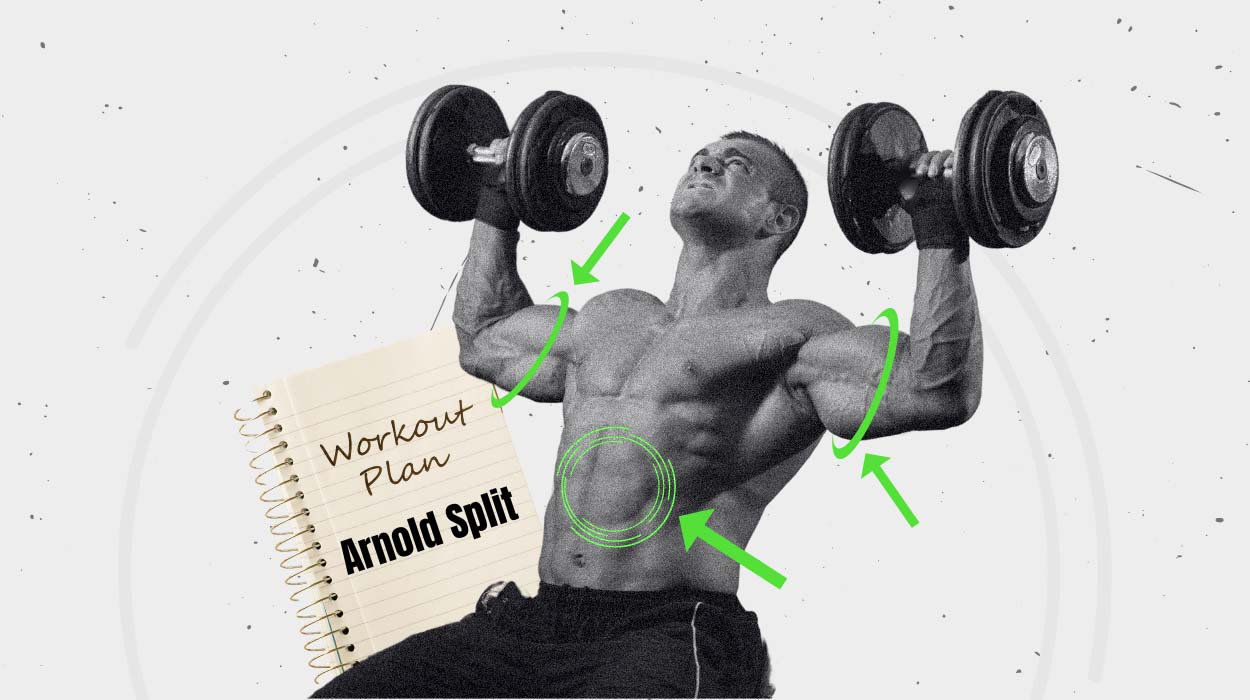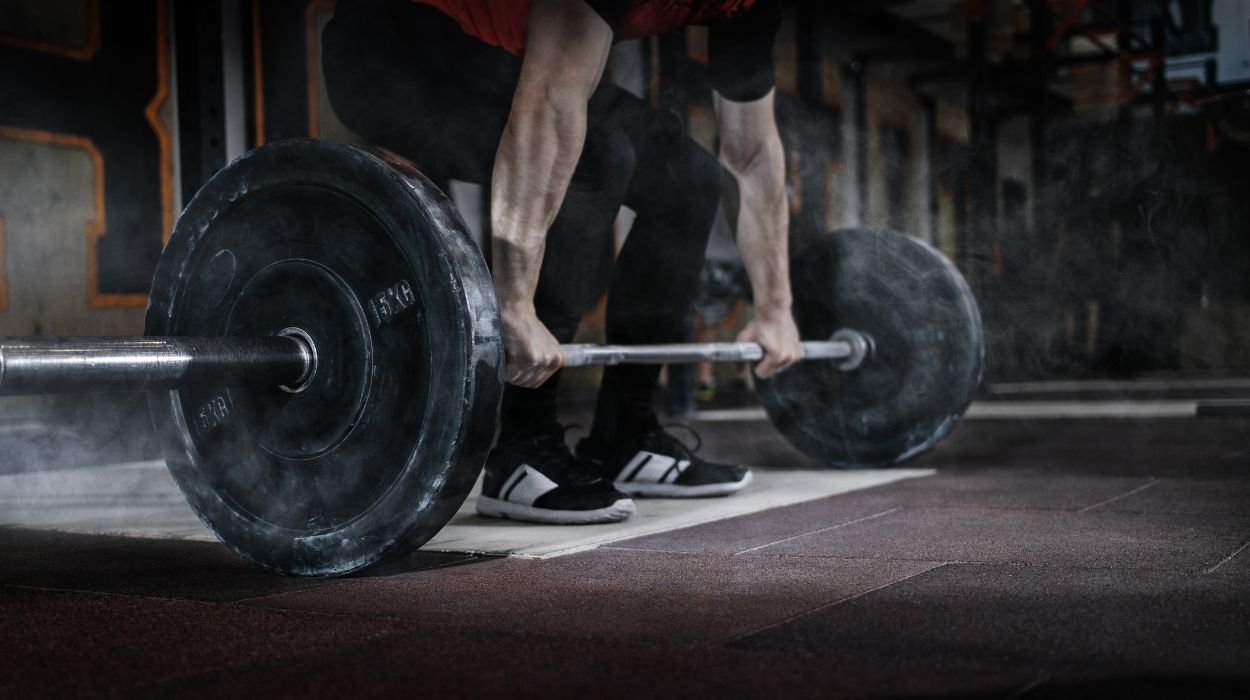
Arnold Schwarzenegger is, without a doubt, the greatest bodybuilder to ever walk among us. He was a giant amongst giants known for his ability to carry vast amounts of muscle mass and perfect the male physique. As such, it makes sense that bodybuilders of all ages would want to train like Arnold did. Luckily, we have a pretty good idea of how he trained and what he did to achieve this greatness.
Like any other efficient bodybuilder, Arnold used various workout plans in his training career. Everything from your classic “bro split” to even training twice a day, Arnold did it. However, one of his favorite workout splits has been dubbed “The Arnold Split. This six-day program will help you break through plateaus and add slabs of lean muscle mass to your frame, just like the master himself.
Six-Day Arnold Split For Lean Muscle Mass
You may be surprised to see so many simple workouts below, but it was these simple workouts that carried Arnold Schwarzenegger to the top. The secret lies not in complexity, but in the exercise rotation and consistency.
One common mistake people make when trying to follow this training split is using isolation exercises. While Arnold did do isolation exercises, the Arnold split focuses on using basic compound exercises, which he relied heavily on. This includes exercises such as the barbell bench press and squats.
While we don’t have time to go through the specifics of all the exercises, below are some of the most popular ones for each muscle group.
Day One: Chest And Back 1
Chest exercises are a fundamental component of any well-rounded fitness routine. These exercises primarily target the pectoral muscles, which play a crucial role in upper body strength and aesthetics. They can help with improved upper body strength, enhanced posture, a more sculpted chest appearance, and increased functional fitness for daily activities.
Strengthening your back muscles can improve posture, reduce the risk of injury, and alleviate back pain. Additionally, a strong back supports proper spine alignment and enhances stability. These exercises target the latissimus dorsi, rhomboids, and other key muscle groups, promoting a well-balanced physique.
| Exercise | Sets x Reps |
| Bench Press | 4 x 8-12 |
| Incline Dumbbell Press | 4 x 8-12 |
| Pull-Ups | 4 sets to failure |
| Bent-Over Rows | 4 x 8-12 |
| Dumbbell Flyes | 3 x 10-15 |
| Lat Pull-Downs (Wide Grip) | 4 x 10-12 |
Day Two: Shoulders And Arms 1
This workout is meticulously designed to sculpt and strengthen the shoulders and biceps, focusing on muscle definition and endurance. Initiating the session with the Military Press, a cornerstone exercise, targets the entire shoulder complex and triceps, enhancing overhead pressing strength and shoulder stability. Transitioning to Lateral Raises, the emphasis shifts to the shoulder’s medial deltoids, critical for achieving that sought-after shoulder width and separation.
The workout then moves onto the biceps with the Barbell Curl, a quintessential movement for mass building, focusing on the biceps brachii’s peak and overall arm girth. Preacher Curls follow, isolating the biceps to prevent momentum usage, ensuring targeted tension and promoting superior bicep growth and shape.
| Exercise | Sets x Reps |
| Seated Dumbbell Press | 4 x 8-12 |
| Cable Lateral raise | 4 x 10-15 |
| Barbell Curls | 4 x 8-12 |
| Tricep Dips | 4 sets to failure |
| Hammer Curls | 3 x 10-12 |
| Skull Crushers | 3 x 8-12 |
Day Three: Legs 1
These exercises improve stability, enhance athletic performance, and aid in weight management by torching calories. Strengthening your legs also promotes better posture and reduces the risk of injury in daily activities.
| Exercise | Sets x Reps |
| Squat | 4 x 8-12 |
| Lunges | 3 x 10-15 |
| Stiff-Legged Deadlifts | 4 x 10-12 |
| Standing Calf Raises | 4 x 15-20 |
Day Four: Chest And Back 2
Day Four revisits the chest and back with a new set of exercises to further challenge these major muscle groups.
This session introduces variations like a decline bench press and seated cable rows, targeting different angles and promoting muscle growth through diverse stimuli. The inclusion of exercises like chest dips and deadlifts adds intensity, engaging multiple muscle groups and enhancing core stability. This day’s routine focuses on refining muscle definition and building on the strength gains from Day 1. By constantly varying the exercises, the workout prevents muscle adaptation and plateauing, ensuring continuous progress and sculpting a well-defined upper body.
| Exercise | Sets x Reps |
| Deadlift | 3 x 6-10 |
| Decline Bench Press | 4 x 8-12 |
| Chest Dips | 4 sets to failure |
| One-Arm Dumbbell Rows | 4 x 8-12 |
| Seated Cable Rows | 4 x 10-12 |
| Cable Flyes | 3 x 10-15 |
Day Five: Shoulders And Arms 2
Returning to the shoulders and arms on Day 5, this workout introduces new exercises like the Arnold Press and reverse curls to further define and strengthen these areas. The session is designed to deepen the sculpting of your upper body, focusing on the finer details of muscle separation and symmetry.
Exercises are selected to hit all angles of the arms and shoulders, ensuring a thorough workout encompassing the major and minor muscle groups. This day aims to enhance the visual aesthetics of your upper body, improving the proportion and definition that contribute to a powerful, athletic appearance. Emphasizing isolation and compound movements, this workout balances building size with sculpting detail.
| Exercise | Sets x Reps |
| Arnold Press | 4 x 8-12 |
| Front Raises | 4 x 10-12 |
| Reverse Curls | 4 x 8-12 |
| Tricep Overhead Extension | 4 x 8-12 |
| Concentration Curls | 3 x 10-12 |
| Tricep Pushdowns | 3 x 10-12 |
Day Six: Legs 2
The final day of the Arnold Split cycle, Day 6, brings another intense leg day focusing on front squats, Romanian deadlifts, and Bulgarian split squats.
This session aims to address any remaining weaknesses in the lower body, ensuring balanced strength and muscular development. Incorporating variations that challenge stability and coordination, like the Bulgarian split squat, enhances muscle engagement and promotes functional strength. This workout not only builds on the foundation set by the first leg day but also introduces exercises that stimulate muscle growth from different angles, encouraging well-rounded development and preventing imbalances. The goal is to finish the week strong, laying the groundwork for both aesthetic improvements and performance enhancements.
| Exercise | Sets x Reps |
| Leg Press | 4 x 10-15 |
| Romanian Deadlifts | 4 x 8-12 |
| Bulgarian Split Squats | 3 x 10-12 |
| Leg Curls | 4 x 10-12 |
| Seated Calf Raises | 4 x 15-20 |
What Is The Arnold Split?

The Arnold Schwarzenegger split is the name given to a six-day training split that was often used by Arnold himself. While this wasn’t the only training program he used, it has become his most well-known and most used by the general public.
What Does Arnold’s Workout Split Look Like?
The Arnold split workout plan consists of three training sessions repeated twice for a total of six sessions in a week. Many people falsely compare this to a push-pull[1] leg (PPL) split which is another three-day training split. In a PPL Arnold split, muscles are grouped by function. That is, your upper body pushing muscles are grouped together (chest, shoulders, triceps) for one training day and your upper body pulling muscles are grouped together (back, biceps) for another, while your lower body has its own day.
In comparison, Arnold grouped his muscles into sections; lower body one day, upper body the next, and a final day for shoulders and arms. This design grouped opposing muscles together, known as agonist-antagonist muscles, and worked them on the same day. For example, the triceps and biceps or quads and hamstrings.
The three days of an Arnold split look like this:
- Day One: Chest And Back (Pectorals, all back muscles).
- Day Two: Shoulders And Arms (Deltoids, biceps, triceps, forearms).
- Day Three: Legs (Quadriceps, hamstrings, glutes, calves).
Days One through Three would then be repeated with one day of rest after.
Benefits Of The Arnold Split Workout
Other than the reward of knowing that you are training just like the master himself, there are many additional benefits to this program. Here are our favorite three benefits to training the Arnold split.
Training Volume For Muscle Growth
Arnold’s training was intense, and so is this workout. This is a high-volume training program that schedules a total of six training sessions every week. “Volume” refers to the total amount of work placed on a specific muscle. This can be calculated by simply adding the total number of sets in a week by adding the total load a muscle moves (i.e. 3 X 10 with 100lbs = 3,000lbs)
Regardless of how you calculate volume, the Arnold split allows you to build a lot of it. This is crucial as volume is the most critical[2] factor for muscle hypertrophy. If building muscle is your goal with resistance training, the Arnold workout split will deliver those results.
Train Each Muscle Group Twice A Week
Let’s be clear. You can definitely build muscle by training a body part once a week. However, the latest sports research[3] suggests that hitting a muscle twice weekly is optimal, even with the same number of sets.
For one, this works well with your body’s recovery mechanisms. When you go to the gym, you’ll break down your muscles and then need two to three days to fully recover. If you train the muscle once a week you would then have to wait another three to four days to train it again.
In comparison, when training a muscle twice a week, you train the muscles after its recovery. This allows the muscle to constantly be in the training & recovery cycle which maximizes its growth potential.
In addition, splitting the total number of sets into two sessions allows for a more intense workout. For example, training the chest with six exercises in one day will produce a lot of “junk reps” as you will be fatigued by your fourth exercise (assuming you train hard enough). Instead, use three exercises in both sessions (i.e., Monday and Thursday) to allow for a more effective workout.
Easily Perform Advance Techniques
As mentioned above, Arnold Schwarzenegger’s workout split is set up so that agonist and antagonist muscle groups are trained on the same day. This allows you to use an advanced training technique known as a superset.
A super set is when you train opposing muscles back-to-back in the same set. For example, you may perform the barbell bench press, take a short rest (15 seconds or so), and then perform some chin-ups.
This has some important benefits, including:
- Increases workload.
- Decreases time.
- Improve conditioning.
How To Do The Arnold Split?

We know what the Arnold split is but now we need to know how to perform it. Remember that the Arnold split doesn’t necessarily tell you what exercises to do, but tells you how to organize your workout plan.
With that in mind, let’s examine some of the training methodologies used in Arnold’s training program.
Use Variety In Your Movements
Arnold strongly believed in including slight variations in your movements. For example, if you’re doing an incline bench press, use various angles. When doing bent-over barbell rolls in a back session, do bent-over barbell rows and dumbbell rows as well to mix it up.
Choose Two To Three Exercises For Major Muscle Groups
Choose two to three exercises for your major muscle groups. This is your chest, back, & shoulders. For your legs, choose three pushing exercises (anterior leg muscles) and three pulling exercises (posterior muscles).
Choose One To Three Exercises For Smaller Muscle Groups
For your biceps, triceps, calves, and abs, choose one to three exercises per session. This will vary depending on how much time you have and if you perform special sets.
Use One To Two Exercises To Train Core
You can train core every training session so you only need to choose one, or perhaps two exercises each session. Use different movement patterns including:
- Flexion in lower abs (Leg raise, hanging knee raise).
- Flexion in upper abs (Reverse crunch).
- Anti-rotation (Pallof press, plank).
- Lateral.
- Rotation.
Use Max Effort
If you’re going to run the Arnold split you must train intensely. By always using max effort reps, Arnold ensured he was working up to muscle failure every set. Therefore, treat every set as if it’s the only set you’re doing and make the most of it.
Use Four To Five Sets And Five To 20 Reps
One unique aspect of this training program is the use of high sets. Instead of three sets as most other workout routines use, Arnold frequently used four or five sets. This even includes smaller training such as his forearm training.
In terms of reps, Arnold used a wide range; anywhere from five to twenty. That said, the majority of his training was in the 8-12 rep range. He saved heavier sets for the primary exercise of the day while using ultra-high reps (15-20) for various leg exercises.
Use Supersets In Moderation
As we spoke about above, the Arnold split works very well utilizing supersets. However, don’t get carried away with using them.
Unless you’re short on time and need to get your workout in fast, you should only use one or two supersets at most. Further, these should be done towards the end of your workout when using smaller exercises.
Deload Every Eight To 12 Weeks
One of the benefits of the Arnold split is that it allows a lot of training volume. While this is awesome for muscle growth, it will also mean that performing a deload is that much more important.
A deload is a training strategy to allow full recovery. To perform one, you will follow your same program but simply half the weight used.
For example, let’s say you are performing the bench press with a four to eight reps scheme and 200 lbs. During your deload, you would continue to use a four to eight reps scheme but you would use 100lbs instead.
Conclusion
The Arnold split is a serious workout plan for serious lifters. This is not for beginners, as it would most likely be too intense for any meaningful progress. However, if you’ve been in the gym for some time, the Arnold split could be just what you need to take your training to the next level.
Many programs exist for lifting weights, and while we can’t say this is the best program ever, we can say it was used by the best bodybuilder ever and is one of the most effective you can use.
Frequently Asked Questions
The Arnold split is very effective for intermediate and advanced athletes. That said, it’s hard to say if it’s more effective than other splits as there are too many factors to consider.
Arnold’s six-day workout split is a six-day split that rotates through three groups of muscle.
The Arnold workout split provides a lot of volume which is the key factor in building muscle.
Resources
- Alexandre Lopes Evangelista, Tiago Volpi Braz, Vazquez, C., Roberta Luksevicius Rica, Angélica Castilho Alonso, Barbosa, W.A., Víctor Machado Reis, Baker, J.S., Schöenfeld, B.J., Danilo Sales Bocalini and Maria, J. (2021). Split or full-body workout routine: which is best to increase muscle strength and hypertrophy? Einstein (São Paulo), [online] 19. doi:https://doi.org/10.31744/einstein_journal/2021ao5781.
- Schoenfeld, B.J. and Grgic, J. (2017). Evidence-Based Guidelines for Resistance Training Volume to Maximize Muscle Hypertrophy. [online] ResearchGate. Available at: https://www.researchgate.net/publication/322023636_Evidence-Based_Guidelines_for_Resistance_Training_Volume_to_Maximize_Muscle_Hypertrophy.
- Schöenfeld, B.J., Ogborn, D. and Krieger, J. (2016). Effects of Resistance Training Frequency on Measures of Muscle Hypertrophy: A Systematic Review and Meta-Analysis. Sports Medicine, [online] 46(11), pp.1689–1697. doi:https://doi.org/10.1007/s40279-016-0543-8.




